
Haunted MTL Original – I Am Your Madeline – Meghan Robins
More Videos
Published
4 years agoon
By
Shane M.“I Am Your Madeline” by Meghan Robins
Emily awoke with the sun on her face, a sweet muskiness on her sheets and the sound of the zipper closing on Douglas’s gym bag.
“I was hoping not to wake you,” Douglas said, stalled at the bedroom door, debating, Emily knew, whether to say sorry or just leave. His chewed-up thumbnail tapped the white trim of her bedroom door. The famous Douglas Bruce Cunningham, renowned playwright with acclaimed performances topping New York City’s charts for the last two years, never said what he did not mean. To say sorry when he was not might crack his moral code, a painful, irresistible trait that attracted Emily to him in the first place.
“I’ll get her to sign the papers today, I promise,” he said.
It was uncharacteristically dark for Emily to envision stabbing his ex-wife in the throat, his cab crashing, her sending every tabloid in New York pictures of their affair. He could have told her he was married long before last night. Instead she looked at him from his sun-soaked bed and said, “When will I see you?”
Douglas smiled. “I have something for you.” He set an envelope on the bookshelf. “Just until the next paycheck comes.”
Emily nodded. Acting had been a poor choice when her grandmother got sick and their finances turned irreparable. But she was finally getting leading roles, and she had Douglas to thank. In her audition, Douglas had been absolutely right to say, “You’re the only one who could play my Madeline.”
From the window, she could see him awaiting his breakfast burrito at the café downstairs, folding the Times to the crossword section and reaching into his bag for a pen. Emily fingered the air conditioning unit, imagined pulling the plug and tipping it headlong out the window. She wanted to believe in his divorce, but couldn’t understood why it had taken him so long to admit that he was still married.
“She’s difficult,” Douglas had explained said last night. “You don’t know her like I do.”
That’s what all married men say to their mistresses. They were practically writing his next play. A man like Douglas, so cerebral, so brilliant, needed a reminder of why he should come back to her.
Emily picked up her phone. She watched as Douglas sent her to voicemail, his hand in his pocket. In the message she sounded strangely outside of herself. Her voice was hers but she hardly recognized it. It was haunting really—short, sweet, serious—but that’s how Douglas preferred things. As she walked home with two thousand dollars in an envelope shoved in her purse, Emily tried not to feel like she’d just traded money for sex.
In the kitchen, she dropped the envelope on the table.
“We need the money,” she said. Her grandmother raised an eyebrow. The kettle whistled and Emily poured a pot of tea.
“I probably won’t see him again,” she told Grammy, fighting off the cold with another blanket.
“Sit down, dear,” Grammy said. “Drink up. Let’s see what we can do.”
When Emily finished her tea, Grammy swirled the dredges of her cup, hunched over until her nose grazed the lip. She mumbled words from the old language, rocked back and forth. The cold apartment grew warmer, brighter. Grammy’s brows furrowed. Her eyes popped open and she backhanded the tea cup to the floor.
Emily kneeled before her. “What is it?”
Grammy wrapped two frail arms around Emily, fingernails digging in like a declawed cat.
“I’ve done a terrible thing.”
Across town, Douglas had just handed his wife their divorce papers. “I’m serious this time,” he said.
Caroline paced the living room that housed ten years of shared belongings.
“Who is she?”
Douglas swirled his cup. The bag had brewed too long and his green tea was bitter. “That’s not why we’re getting a divorce,” he said.
“Don’t tell me she’s your muse, that your career depends on it. How many muses have you had, Douglas? Five? Ten? Don’t say I’m not the reason your writing career took off in the first place. Caroline, Madeline? You practically named her after me. The entire play is about how we met.”
“But our divorce is—”
Caroline screamed, sweeping her arms across Douglas’s desk, clattering papers, pens, his laptop to the floor.
“I’m sick of your impenetrable reasoning! Your need to be right. Always right. How does a man who only speaks the truth cheat on his wife?”
“I didn’t cheat on you, Caroline. Our marriage was over long before—”
“Before whom. Her? The one before her?”
Douglas picked a pen off the floor. “Just sign the papers.”
Long red-nailed fingers reached forward, and for a moment, their hands touched. Caroline waited for him to feel something.
“The reason—” Douglas started.
“Don’t,” Caroline said, ripping the pen from his hand.
Douglas raised his voice. “The reason for our divorce is…”
Before he could finish, a red and white ballpoint with Marriot written across its side punctured his jugular.
His green tea splashed across the Safavid carpet. The divorce papers clutched in his right hand. As Douglas gurgled on the floor, Caroline stepped over him.
“Not so quickly, my love,” she said and sat him upright, pressing her palm to his throat.
Three days later, the Times reported the elopement of Mr. and Mrs. Douglas Bruce Cunningham, that they were moving back to Bali, that he was retiring from the stage. Heartbreak overtook Emily, but so did her need to pay the bills. Her grandmother was requiring more medical attention, and Emily told her agent she’d take anything. She resorted to T.V. commercials, none of which she was getting. At one audition, a woman recognized her. They’d worked together on The Diner’s Dilemma, Douglas’s breakout play and Emily’s breakout role.
“Did you hear what happened?” The actress said. “I think she killed him. Why else would he leave at the height of his career?”
Warmth plucked at Emily’s spine.
“She was a witch you know. He found her on that island. I heard their divorce papers were never signed, which means she gets everything. Everything. Read it. It’s all in the tabloids.”
Emily did not get the car commercial, even though it was just her foot depressing the clutch and her hand shifting gears. She didn’t get the toothpaste bit or the airline ad. When her agent called with an audition that sounded like a good fit, “They’re looking for Cunningham girls. You’re a shoe-in,” her grandmother nearly threw herself from her chair. When Emily listened to the message again to confirm the date and address, an entire shelf of mugs clattered to the floor
Emily said, “Grammy, stop this.”
Then the garbage disposal turned on.
“Grammy.” Emily walked over and flipped the switch.
“It’s him,” Grammy said. “I called him back.”
The next day the crossword appeared at the kitchen table. On her way to the corner store, a toaster nearly hit Emily from a three-story window. She’d had enough.
“What do you want from me, Douglas?” Emily yelled.
She returned home to find mustard-yellow cursive looping across her kitchen table. The words spelled, “Don’t go.”
Grammy pleaded that she listen to him.
“We need the money,” Emily said and left.
The audition was Tuesday four o’clock. The metal door to the elevator cage clanked shut. When the bellhop tipped the brass lever forward, the elevator rattled down. Emily had expected it to pull up. Two stories underground the cage opened to the orange glow of a backstage. Red curtains were drawn, a slit of yellow emanating beneath them. It sounded like a full house.
The bellhop handed her a paper. Half a dozen actresses stood in a single file line. Many wore long sleeves and skirts, most of them navy blue. Emily didn’t recall suggested costumes but today she wore her usual pleated skirt, an ivory blouse, her teal cardigan embroidered with daisies sprouting from her breast pocket. Her hair, always short, seemed to match the others, and for a fleeting moment she felt the opposite of stand out. Still, it’s fortuitous, she thought, that her norm was in line with whatever character she was vying for. Emily took her place in the queue, tried to read her lines, but eventually tapped the shoulder of the woman in front of her.
“Excuse me. Do you know the line? I can’t seem to read my paper.”
The woman turned and two white orbs popped out of sleep-deprived sockets. Red lightning bolts blasted from each iris. Drugs, Emily thought.
“She’ll tell you,” the actress said. Her voice sounded scabbed, hoarse. One bulbous tear pooled along her red-rimmed eyelid, then dropped to the floor.
Emily looked at the wet splotch. “Thank you,” she said, and the line moved forward.
Another woman burst off stage with hands cupping her head. She rushed toward the elevator, which had already been called up, stopped abruptly, turned, and then cut in line.
“Excuse me,” said Emily, “I—”
The woman lowered her hands. Patches of hair had been ripped from the top of her head. Her sallow cheeks looked so deprived they were nearly bruised. Emily gasped, waved her hand as if gesturing for the last seat on the bus. The woman stepped forward, gripped her paper, yellow and worn, and began mumbling her words over and over.
Sweat was beginning to bend Emily’s own sheet of paper. She was clutching it, wrinkling it. The next woman to exit stage left looked like a porcelain doll before her eyelids were painted on. She marched straight to the elevator, which was not there, and stepped into the open abyss. Moments later, the elevator appeared, rising up from below with her standing inside. The bellhop helped her out and she took her place at the back of the line.
Emily was being sieved to the front, only two actresses away from the curtain. A shrill voice on stage yelled, “Next!” and the woman with patchy hair parted the curtains and stepped through. Moments later she burst backstage, fingernails tearing open her scalp. It was Emily’s turn.
On stage, Emily suddenly felt at ease in the light. Her senses returned to her last star performance in The Diner’s Dilemma. The smells, the sounds, the audience was all there. Just as she remembered it. Even the woman in the front row was so familiar Emily ached with comfort. In fact, that woman’s face, so well framed in flowing brown hair, her lips a deep shade of red, looked more beautiful than all the other nights Emily had performed for her. No longer in her teal cardigan and navy skirt, Emily donned the yellow and blue cocktail dress from The Diner’s Dilemma. This woman, Emily realized, had been there for every single performance. While a Douglas Bruce Cunningham play promised highly sought-after bragging rights among high-brow friends, to see it more than once was excessive.
The red-lipped woman was vivid, stunning. Her rosy cheeks and ruby lips were in direct contrast to the audience around her. Their pallor skin clung to skeletal structures. Hundreds of men and women filled the auditorium, their contorted expressions both a result of being bored to death as well as being, most likely, dead. The woman, hot-blooded and radiant, linked arms with a man beside her. His pointed chin drawn so tight it almost appeared as just bone.
“Tell me darling.” The woman’s voice cut like the wind. “Is that her?”
The man, hardly a man, a skeleton being kept alive by a shoestring, raised himself to look at Emily.
Emily toed the seam of the floorboards. She was becoming the waitress of the play again, her tight apron snug and un-utilitarian across her thighs. The lines she’d recited for nearly two years, the lines written by the once famous Douglas Bruce Cunningham, came back to her like a song. They burst out of her with the familiar fervor Douglas had always encouraged in her. For no reason at all she started in the middle of act two, the scene where her character realizes she’s in love with her customer.
“Stop!” the woman shrieked. “Read your line.”
“But the page is blank.”
“Read it.”
Words began to appear on the crumpled paper, first in gray, then black. Emily faltered in her yellow heels.
“Read it,” the woman said.
Emily could not. Would not. The woman, her dress. The dress Douglas had once pointed to in a shop window and asked if Emily liked it. The dress Emily said was too formal a gift for someone he’d been dating only two months. The dress she saw later that week on a woman in the audience and thought, there, there’s a woman whose husband loves her… That dress.
The man whose chin stuck out like bone, whose cowed look was suddenly so familiar Emily could feel his hands caressing her cheek and the sunlight raising musk from her bed.
“Read it,” the woman said again, and Emily did as she was told.
As each word formed in her diaphragm, passing up her esophagus and through her lips, she felt their reverberations tear through her innards. As if the letters were forming inside her, their sharp corners ripping like shards in her voice box.
“Again,” the woman said. Every time Emily repeated her line, her intestines tore until she was coughing bits of blood.
“Again.”
Emily spit part of her stomach lining onto the hardwood.
“Again.”
Finally, her voice was so raw, her mouth so full of iron, she practically gargled it out: “I am your Madeline.”
Exhausted, bruised, Emily stood her ground, feeble but standing.
The woman looked at the man beside her. “Douglas, dear, is that the woman who tore our life apart? Is she the reason you divorced me?”
The man glanced at the carnage on stage, turned the question over in his mind. Emily pleaded. She was not the reason, but she was the cause. One of many, it seemed. Yet why had this woman, this stupid woman, phrased it just so? No wonder he’d divorced her. In the six months of their affair, Emily had learned to be more careful with her word choice. Say precisely what you mean. But this woman knew that, didn’t she.
She asked again, “Dear husband. Is she the reason you divorced me?”
Douglas, dead or dying and morally tortured, shook his head no.
His wife smirked. Guffawed. “I heard the message on his phone, darling. Perhaps if you say it exactly as you did then, he’ll remember you. All I want is to hear him say it. To say he cheated on me, but he doesn’t seem to recall. Convince him of that and you will all be released. Next time, dear, say it better.”
Emily gripped her blood-stained paper and exited stage left. Behind the curtains a half dozen listless faces looked at her, pleading. Then the screech from front stage called the next woman forward. The mumble of actresses continued. Emily stepped to the back of the line.

Meghan Robins lives in Bend, Oregon, where she spends her time writing, running, and circumambulating mountains with her partner and friends. Her work has appeared in VocieCatcher, Powder Magazine, The Kokanee Review, and the short story collection Tahoe Blues. She is currently working on a historical novel set in a logging camp in Lake Tahoe in 1860.
You may like
1 Comment
Leave a Reply
Cancel reply
Leave a Reply
This site uses Akismet to reduce spam. Learn how your comment data is processed.
Original Creations
Goodbye for Now, a Short Story by Jennifer Weigel
Published
1 day agoon
March 30, 2025What if ours weren’t the only reality? What if the past paths converged, if those moments that led to our current circumstances got tangled together with their alternates and we found ourselves caught up in the threads?
Marla returned home after the funeral and wake. She drew the key in the lock and opened the door slowly, the looming dread of coming back to an empty house finally sinking in. Everyone else had gone home with their loved ones. They had all said, “goodbye,” and moved along.
Her daughter Misty and son-in-law Joel had caught a flight to Springfield so he could be at work the next day for the big meeting. Her brother Darcy was on his way back to Montreal. Emmett and Ruth were at home next door, probably washing dishes from the big meal they had helped to provide afterward, seeing as their kitchen light was on. Marla remembered there being food but couldn’t recall what exactly as she hadn’t felt like eating. Sandwiches probably… she’d have to thank them later.
Marla had felt supported up until she turned the key in the lock after the services, but then the realization sank deep in her throat like acid reflux, hanging heavy on her heart – everyone else had other lives to return to except for her. She sighed and stepped through the threshold onto the outdated beige linoleum tile and the braided rag rug that stretched across it. She closed the door behind herself and sighed again. She wiped her shoes reflexively on the mat before just kicking them off to land in a haphazard heap in the entryway.
The still silence of the house enveloped her, its oppressive emptiness palpable – she could feel it on her skin, taste it on her tongue. It was bitter. She sighed and walked purposefully to the living room, the large rust-orange sofa waiting to greet her. She flopped into its empty embrace, dropping her purse at her side as she did so.
A familiar, husky voice greeted her from deeper within the large, empty house. “Where have you been?”
Marla looked up and glanced around. Her husband Frank was standing in the doorway to the kitchen, drying a bowl. Marla gasped, her hand shooting to her mouth. Her clutched appendage took on a life of its own, slowly relinquishing itself of her gaping jaw and extending a first finger to point at the specter.
“Frank?” she spoke hesitantly.
“Yeah,” the man replied, holding the now-dry bowl nestled in the faded blue-and-white-checkered kitchen towel in both hands. “Who else would you expect?”
“But you’re dead,” Marla spat, the words falling limply from her mouth of their own accord.
The 66-year old man looked around confusedly and turned to face Marla, his silver hair sparkling in the light from the kitchen, illuminated from behind like a halo. “What are you talking about? I’m just here washing up after lunch. You were gone so I made myself some soup. Where have you been?”
“No, I just got home from your funeral,” Marla spoke quietly. “You are dead. After the boating accident… You drowned. I went along to the hospital – they pronounced you dead on arrival.”
“I don’t know what you’re talking about,” Frank said. “What boating accident?”
“The sailboat… You were going to take me out,” Marla coughed, her brown eyes glossed over with tears.
“We don’t own a sailboat,” Frank said bluntly. “Sure, I’d thought about it – it seems like a cool retirement hobby – but it’s just too expensive. We’ve talked about this, we can’t afford it.”
Marla glanced out the bay window towards the driveway where the small sailboat sat on its trailer, its orange hull reminiscent of the Florida citrus industry, and also of the life jacket Frank should have been wearing when he’d been pulled under. Marla cringed and turned back toward the kitchen. She sighed and spoke again, “But the boat’s out front. The guys at the marina helped to bring it back… after you… drowned.”
Frank had retreated to the kitchen to put away the bowl. Marla followed. She stood in the doorway and studied the man intently. He was unmistakably her husband, there was no denying it even despite her having just witnessed his waxen lifeless body in the coffin at the wake before the burial, though this Frank was a slight bit more overweight than she remembered.
“Well, that’s not possible. Because I’m still here,” Frank grumbled. He turned to face her, his blue eyes edged with worry. “There now, it was probably just a dream. You knew I wanted a boat and your anxiety just formulated the worst-case scenario…”
“See for yourself,” Marla said, her voice lilting with every syllable.
Frank strode into the living room and stared out the bay window. The driveway was vacant save for some bits of Spanish moss strewn over the concrete from the neighboring live oak tree. He turned towards his wife.
“But there’s no boat,” he sighed. “You must have had a bad dream. Did you fall asleep in the car in the garage again?” Concern was written all over his face, deepening every crease and wrinkle. “Is that where you were? The garage?”
Marla glanced again at the boat, plain as day, and turned to face Frank. Her voice grew stubborn. “It’s right here. How can you miss it?” she said, pointing at the orange behemoth.
“Honey, there’s nothing there,” Frank exclaimed, exasperation creeping into his voice.
Marla huffed and strode to the entryway, gathering her shoes from where they waited in their haphazard heap alongside the braided rag run on the worn linoleum floor. She marched out the door as Frank took vigil in its open frame, still staring at her. She stomped out to the boat and slapped her hand on the fiberglass surface with a resounding smack. The boat was warm to the touch, having baked in the Florida sun. She turned back towards the front door.
“See!” she bellowed.
The door stood open, empty. No one was there, watching. Marla sighed again and walked back inside. The vacant house once again enveloped her in its oppressive emptiness. Frank was nowhere to be found.

So I guess it’s goodbye for now. Feel free to check out more of Jennifer Weigel’s work here on Haunted MTL or here on her website.
Today on Nightmarish Nature we’re gonna revisit The Blob and jiggle our way to terror. Why? ‘Cause we’re just jellies – looking at those gelatinous denizens of the deep, as well as some snot-like land-bound monstrosities, and wishing we could ooze on down for some snoozy booze schmoozing action. Or something.
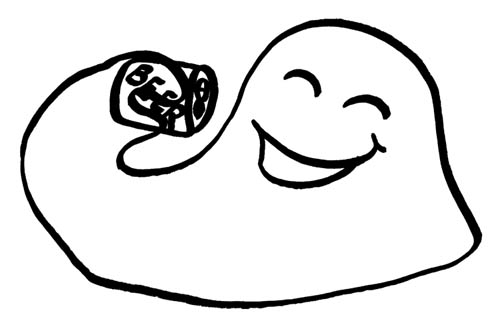
Honestly, I don’t know what exactly it is that jellyfish and slime molds do but whatever it is they do it well, which is why they’re still around despite being among the more ancient organism templates still in common use.
Jellyfish are on the rise.
Yeah, yeah, some species like moon jellies will hang out in huge blooms near the surface feeding, but that’s not what I meant. Jellyfish populations are up. They’re honing in on the open over-fished ocean and making themselves at home. Again.
And, although this makes the sea turtles happy since jellies are a favorite food staple of theirs, not much else is excited about the development. Except for those fish that like to hide out inside of their bells, assuming they don’t accidentally get eaten hanging out in there. But that’s a risk you gotta take when you’re trying to escape predation by surrounding yourself in a bubble of danger that itself wants to eat you. Be eaten or be eaten. Oh, wait…
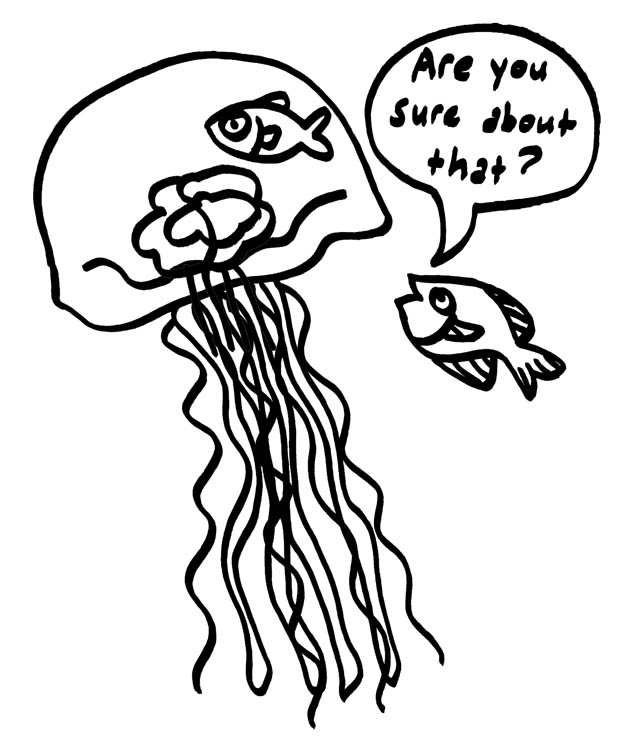
So what makes jellies so scary?
Jellyfish pack some mighty venom. Despite obvious differences in mobility, they are related to anemones and corals. But not the Man o’ War which looks similar but is actually a community of microorganisms that function together as a whole, not one creature. Not that it matters when you’re on the wrong end of a nematocyst, really. Because regardless what it’s attached to, that stings.
Box jellies are among the most venomous creatures in the world and can move of their own accord rather than just drifting about like many smaller jellyfish do. And even if they aren’t deadly, the venom from many jellyfish species will cause blisters and lesions that can take a long time to heal. So even if they do resemble free-floating plastic grocery bags, you’d do best to steer clear. Because those are some dangerous curves.
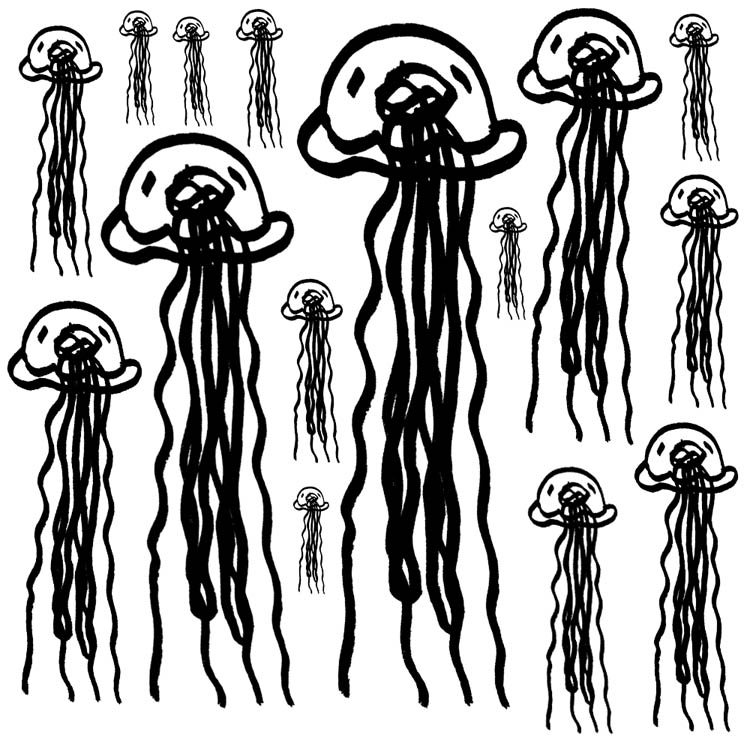
But what does this have to do with slime molds?
Absolutely nothing. I honestly don’t know enough about jellyfish or slime molds to devote the whole of a Nightmarish Nature segment to either, so they had to share. Essentially, this bit is what happened when I decided to toast a bagel before coming up with something to write about and spent a tad too much time in contemplation of my breakfast. I guess we’re lucky I didn’t have any cream cheese or clotted cream…
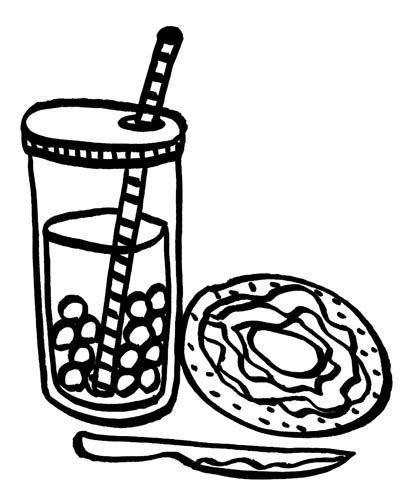
Oh, and also thinking about gelatinous cubes and oozes in the role-playing game sense – because those sort of seem like a weird hybrid between jellies and slime molds, as does The Blob. Any of those amoeba influenced creatures are horrific by their very nature – they don’t even need to be souped up, just ask anyone who’s had dysentery.
And one of the most interesting thing about slime molds is that they can take the shortest path to food even when confronted with very complex barriers. They are maze masterminds and would give the Minotaur more than a run for his money, especially if he had or was food. They have even proven capable of determining the most efficient paths for water lines or railways in metropolitan regions, which is kind of crazy when you really think about it. Check it out in Scientific American here. So, if we assume that this is essentially the model upon which The Blob was built, then it’s kind of a miracle anything got away. And slime molds are coming under closer scrutiny and study as alternative means of creating computer components are being explored.
Jellies are the Wave of the Future.
We are learning that there may be a myriad of uses for jellyfish from foodstuffs to cosmetic products as we rethink how we interact with them. They are even proving useful in cleaning up plastic pollution. I don’t know how I feel about the foodstuff angle for all that they’ve been a part of various recipes for a long time. From what I’ve seen of the jellyfish cookbook recipes, they just don’t look that appealing. But then again I hate boba with a passion, so I’m probably not the best candidate to consider the possibility.
So it seems that jellies are kind of the wave of the future as we find that they can help solve our problems. That’s pretty impressive for some brainless millions of years old critter condiments. Past – present – perpetuity! Who knows what else we’d have found if evolution hadn’t cleaned out the fridge every so often?
Feel free to check out more Nightmarish Nature here.
Original Series
Lucky Lucky Wolfwere Saga Part 4 from Jennifer Weigel
Published
2 weeks agoon
March 17, 2025Continuing our junkyard dawg werewolf story from the previous St. Patrick’s Days… though technically he’s more of a wolfwere but wolfwhatever. Anyway, here are Part 1 from 2022, Part 2 from 2023 and Part 3 from 2024 if you want to catch up.

Yeah I don’t know how you managed to find me after all this time. We haven’t been the easiest to track down, Monty and I, and we like it that way. Though actually, you’ve managed to find me every St. Patrick’s Day since 2022 despite me being someplace else every single time. It’s a little disconcerting, like I’m starting to wonder if I was microchipped way back in the day in 2021 when I was out lollygagging around and blacked out behind that taco hut…
Anyway as I’d mentioned before, that Scratchers was a winner. And I’d already moved in with Monty come last St. Patrick’s Day. Hell, he’d already begun the process of cashing in the Scratchers, and what a process that was. It made my head spin, like too many squirrels chirping at you from three different trees at once. We did get the money eventually though.
Since I saw you last, we were kicked out of Monty’s crap apartment and had gone to live with his parents while we sorted things out. Thank goodness that was short-lived; his mother is a nosy one for sure, and Monty didn’t want to let on he was sitting on a gold mine as he knew they’d want a cut even though they had it made already. She did make a mean brisket though, and it sure beat living with Sal. Just sayin.
Anyway, we finally got a better beater car and headed west. I was livin’ the dream. We were seeing the country, driving out along old Route 66, for the most part. At least until our car broke down just outside of Roswell near the mountains and we decided to just shack it up there. (Boy, Monty sure can pick ‘em. It’s like he has radar for bad cars. Calling them lemons would be generous. At least it’s not high maintenance women who won’t toss you table scraps or let you up on the sofa.)
We found ourselves the perfect little cabin in the woods. And it turns out we were in the heart of Bigfoot Country, depending on who you ask. I wouldn’t know, I’ve never seen one. But it seems that Monty was all into all of those supernatural things: aliens, Bigfoot, even werewolves. And finding out his instincts on me were legit only added fuel to that fire. So now he sees himself as some sort of paranormal investigator.
Whatever. I keep telling him this werewolf gig isn’t all that it’s cracked up to be, and it doesn’t work like in the movies. I wasn’t bitten, and I generally don’t bite unless provoked. He says technically I’m a wolfwere, to which I just reply “Where?” and smile. Whatever. It’s the little things I guess. I just wish everything didn’t come out as a bark most of the time, though Monty’s gotten pretty good at interpreting… As long as he doesn’t get the government involved, and considering his take on the government himself that would seem to be a long stretch. We both prefer the down low.
So here we are, still livin’ the dream. There aren’t all that many rabbits out here but it’s quiet and the locals don’t seem to notice me all that much. And Monty can run around and make like he’s gonna have some kind of sighting of Bigfoot or aliens or the like. As long as the pantry’s stocked it’s no hair off my back. Sure, there are scads of tourists, but they can be fun to mess around with, especially at that time of the month if I happen to catch them out and about.
Speaking of tourists, I even ran into that misspent youth from way back in 2021 at the convenience store; I spotted him at the Quickie Mart along the highway here. I guess he and his girlfriend were apparently on walkabout (or car-about) perhaps making their way to California or something. He even bought me another cookie. Small world. But we all knew that already…
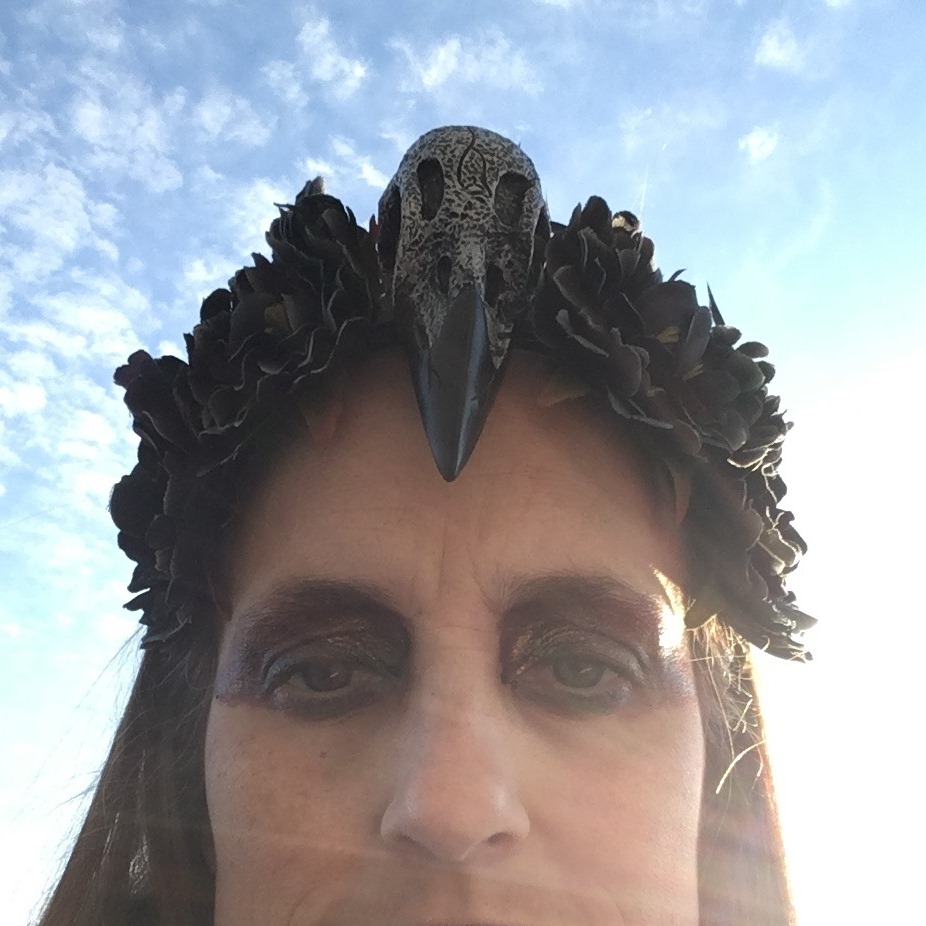
If you enjoyed this werewolf wolfwere wolfwhatever saga, feel free to check out more of Jennifer Weigel’s work here on Haunted MTL or here on her website.




michael dowden
July 5, 2021 at 5:47 pm
Very well done..👌
Michael Dowden